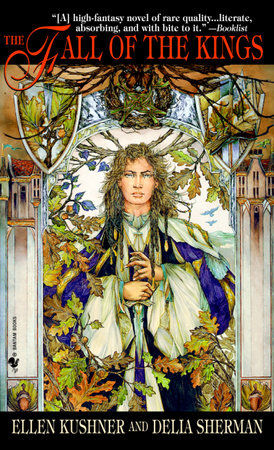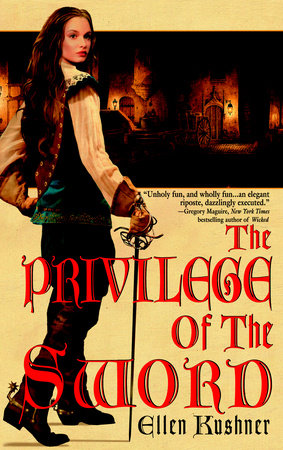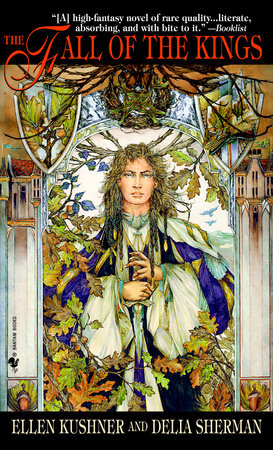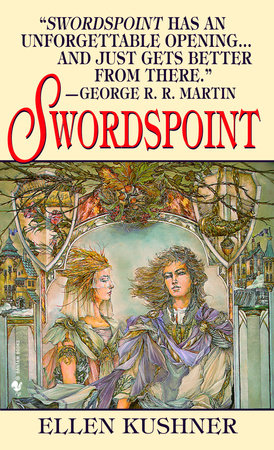Excerpt
The Fall of The Kings
Chapter 1
Five hundred years ago and more, a king rode out of the North at the head of an army. He rode with a company of splendid men, all armed to the teeth. They rode not to war, but to a wedding. After centuries of conflict, the rocky North and the fertile South were at last to be joined into one kingdom in the persons of their King and Queen and their heirs perpetual, united against their common enemies and increasing in mutual prosperity.
The Southern Queen's Chronicler, Valerian Hollis, had described the King's army in horrified detail. Their armor was leather and hammered bronze. Under their helms, their long hair was braided with leather and bones and beads and even nuggets of gold. Every one of them was blood kin to his king, and as they came through the streets of the capital city, they sang.
In the eyes of the Southern nobles, the King's Companions were strange enough, with their barbaric mien and their uncouth songs of war and the hunt. But they brought with them men that they called wizards, and the wizards were worse.
The wizards did not sing. Indeed, they barely spoke, except to one another. There were (according to Hollis) fifteen of them, riding horseback just behind the king. The King's Wizards were robed in black or brown, russet or ochre: peasants' colors, colors of the land. Some were cloaked in the skins of animals. Their faces were bearded, their hair unbound and crowned with leaves. From the hands of certain of them, tendrils of ivy grew.
Thus Hollis in the final chapter of his Chronicle History of the Northern Kings, a work written at the behest of Queen Diane and her new consort, Alcuin, later called the Diplomat. It was a book every historian should own; Basil St Cloud had bought his when he was still a student, and lived on bread and cheese for the rest of the month to pay for the used, leather-bound volume. Now he was a Doctor of History, and the margins of its pages were lined with notes, the leather cover buttery with handling. But it had failed to enlighten him on the subject he was currently researching.
With a sigh, he set the volume aside. If only Hollis had not insisted on cluttering up his account with so much about the wonder of these so-called wizards. Wizards, indeed! The very word evoked nameless rituals and dark mysteries, when everyone knew that their "magic" had been nothing more than sleight-of-hand coupled with diplomacy. But they certainly had made an impressive show. As many times as Basil had read the description, it still gave him a chill: ". . . their hair so twined about with leaves of Ivie and of Oak, as to make them seem in themselves to be Trees and Creatures of the Wood come riding into our Citie to take it through the Greening of the verrie Stones. . . ."
Basil shook his head. Very pretty. Very fanciful. Charged with collecting facts from his new compatriots, but unable to understand most of what they said, Hollis had simply conflated history and legend. Still, the book was pretty much all modern scholars had to go by. The pre-Union North was known for the strength of its warriors, not its record-keeping. And Hollis really had witnessed the events of the Union. Now, if only he'd been more interested in laws of inheritance than in trees on horseback. . . .
A knock on his door interrupted his fulminations. "St Cloud!" He recognized the voice of his friend Thomas Elton, Doctor of Astronomy. "St Cloud, I know you're in there, now open up!"
Without regret, the historian opened the door to his rooms. "How now, my fair one!" It was an old joke. Elton had the face and figure of a bull-dog, but his hair, which he wore long by University tradition, was an incongruously beautiful honey-colored mane that his friends loved to tease him about. "Have you come all this way to invite me to dinner, or do you just want to stick your ridiculous astral spyglass out my window again?"
Elton grinned. "I'll accept your kind offer, if it ever clears up. You live so much closer to the heavens than the rest of us, and I want to get another good look at that comet. Stars with fiery hair, they don't come around that often. And this one's such a beauty, Basil."
"Yes, you've said. But that's not what you're here for."
"Right. If I thought you had any wine to offer me I'd make you produce it--but instead, I come to tell you that there's been a sighting of Leonard Rugg in the fiery precincts of the Blackbird's Nest, ordering the ingredients for a brandy-punch!"
Basil said archly, "I don't suppose it was Cassius who spotted him?"
"And is saving us a couple of seats."
"Blessed Cassius." Basil finally found his cap and jammed it on his head. "A mathematician can always be relied upon to count the right number of guests. Onward, let us onward, like the invading Ophidian army on the Plains of Garrawan. Look out for the broken step."
The streets of the University were the streets of the city, and some of the oldest. They lay on the east bank of the river, where, it was said, King Alcuin's wizards had first taken up residence after the Union. Certainly the streets were close and twisty and notoriously difficult to navigate, particularly late at night. The school had been tiny at first, not much more than a few classrooms nestled in a warren of government edifices. But time and history had wrought their changes. Buildings that once had been halls of state were now lecture halls, and the dens of civil servants and kings' companions had been turned to students' quarters, rented out to as many aspiring young scholars as could fit in a room. The taverns that dotted every corner were probably the oldest structures that retained their purpose. Across the troubled maelstrom of time, people always need a beer.
The tavern known as the Blackbird's Nest was awash in the dark-robed scholars who gave it its name. Its ceiling was low and black-beamed, its ancient walls as deep as a man's arm from hand to elbow, its windows sunk in alcoves. The feet of untold generations of drinkers and debaters had worn troughs into the stone of its floor; their shoulders had polished the stone walls black and smooth. Basil had been coming there since he was a young student, fresh off the farm--not as many years ago as he liked to think. He'd met Elton and Cassius there, accomplished scholars of two years' standing. They had advised him on University ways, from simple matters like letting your hair grow long to avoid looking like a country bumpkin and always giving way to a magister on the street to the intricacies of getting credit in a tavern and the maximum number of lectures he might attend without paying the magister a fee. And they'd invited him along with them to meet the brilliant young Doctor of Metaphysics, Leonard Rugg, known for his generosity with the punchbowl and his stimulating debates on everything from women to the meaning of the stars.
For all four men, the meeting had been a momentous one. The three young scholars had found a shrewd mentor; Rugg had found three kindred spirits. He was not surprised when each of them had resisted the world's call for educated men to stock its law courts and schoolrooms, its nobles' secretarial staffs and charitable institutions. Elton, Cassius, and finally St Cloud remained at University, become Fellows and then Doctors of their chosen subjects, and had been licensed to lecture by the Governors. The four of them had become a familiar sight: Basil St Cloud of History, sturdy and pale, with perennially stubbled cheeks and black, unruly hair; Thomas Elton of Astronomy, stocky and cheerful; Lucas Cassius of Mathematics, lean and saturnine; and Leonard Rugg of Metaphysics, not nearly as old as he pretended to be, his skin pink, his forehead high, his thinning reddish hair standing out from his scalp like new-shorn fleece.
"Time marches on," Rugg was saying testily to Cassius, "but the boy with the brandy is slower than a tart with a noble client. And didn't you say young St Cloud and Elton were coming?"
"On their way," the mathematician answered. "Remember, patience is the virtue of the truly wise."
Rugg snorted. "Nonsense. Patience gets you nothing but a cold bed. Who's been filling your head with platitudes, eh? Your old mother?"
"Placid," Cassius said smugly, "in his Of Manners and Morals. I remember you lecturing on it, Leonard. You were, of course, much more eloquent at the time."
"Don't you quote Placid to me, you damned cabbage-counter. Always thought Placid was a damned fool," Rugg said, "when he wasn't being a genius. Ah, here's the brandy!"
Easing a laden tray onto the table, the potboy unloaded two steaming jugs, four heavy pottery mugs, and several little dishes containing sugar and spices. Rugg pushed back his bench, stood ponderously, cracked his knuckles and began to assemble the punch. A savor of cinnamon and cloves rose above the table in an alcoholic cloud.
"Is that brandy-punch I smell?" Elton said brightly, looming over them.
"It will be," Rugg answered, "if you don't jog my arm. Sit down, Elton--no, over there, with St Cloud. Basil, dear boy, where have you been hiding?"
"Nowhere I can't be found," Basil answered mildly, "as Elton has just happily proved."
Cassius sighed with an exaggerated melancholy, and laced his skinny fingers in his lanky hair. "Would that all proofs were so easily made! Basil, I hear you're writing another book, and good for you. In fact," he caught Elton's eye across the table, "very good for you, indeed."
"Which means what, exactly?"
Basil's question went unanswered as Rugg lifted the ladle high and made a brief speech about friendship and taverns and wine. Rugg favored the rhetorical style of the Gerardine metaphysicians, his current academic preoccupation. Basil cupped his hands around his steaming mug. Autumn was coming on chill this year.
The four friends toasted each other and the beginning of the Harvest Term, wishing each other plenty of paying students for all and a new, more faithful mistress for Rugg. They ordered up a dinner of roast chicken, greens, and buttered squash, and tucked into it as if they'd not eaten for days.
"The Horn Chair lecture's back on, had you heard?" Elton asked through a mouthful of chicken.
"Impossible," said Rugg. "The Horn Professor's at death's door. Has been since Midsummer."
Cassius sipped his punch. "It's not like you to be so far behind the gossip, Rugg. Doctor Tortua was at death's door, but he's better now. Not enough better, I'd have thought, to go about giving public lectures, but I'm no physician. You were Tortua's man, St Cloud. What do you know about it?"
St Cloud shrugged. "Not much. We haven't been friendly since my monograph on the Treaty of Arkenvelt."
"I remember," said Rugg. "You took his chapter in The Fall of the Kings and made mincemeat of it, didn't you, against all advice and common sense."
"But he got it wrong, and all because he didn't go back to the treaty itself and relied instead on Delgardie's report in A Mirror of History, which was already second-hand at best. As I said at the time." He glared at Rugg, who looked ready to argue the whole point again. "It's done, Rugg, and can't be undone. Doctor Crabbe's his heir apparent now, and much joy may he have of him."
"You're hopeless, Basil." Elton looked over his shoulder into the Blackbird's noisy, candlelit room. "Doesn't Roger Crabbe drink here too?"
"I haven't seen him," St Cloud said. "Not since Spring Term, not here."
"Well, his friends, then. You don't need to like Crabbe, but there's nothing to be gained by making an enemy of him."
"And what would his friends tell him?" St Cloud demanded. "He already knows I don't like him; I've told him as much to his face. And he's welcome to hear that I'm sorry I quarreled with Doctor Tortua--well, not sorry, exactly, since I'd do the same again. But sad. I'd like to make it up with him."
The eminent doctor had recognized in the young St Cloud a love of ancient things that matched his own. In Basil's second year, he'd wooed him away from the law he'd come to the city to study and shepherded him up through University ranks. It was Tortua's influence, as well as his own industry, that had made Basil the youngest man ever to achieve the rank of Doctor. He had loved the old man like a father, and had been proportionately wounded when Tortua had taken Basil's monograph on the Treaty of Arkenvelt as a personal attack rather than a simple scholarly correction.
"Make it up with him!" scoffed Elton. "I doubt Tortua would even see you, especially as Crabbe's his doorkeeper these days, they say."
"I thought Crabbe was avoiding me," St Cloud said.
"You flatter yourself," said Cassius. "He was nursing Tortua."
"Lobbying to be the next Horn Chair of Ancient History, if you ask me," Elton said, and Rugg nodded.
"That's disgusting," exclaimed St Cloud. "Not even Crabbe would do a thing like that."
His three companions exchanged the superior smiles of men who, knowing a friend's weakness, love him in spite of it.
"So," said Rugg after a pause, "are you still going to the lecture?"
St Cloud, with little else to stand on, stood on his dignity. "Of course I'm going. I'm in ancient history. I'd go whoever was giving the lecture, even if it were Crabbe himself."
"We'll see you there, then," said Elton cheerfully.
"Yes," said Cassius. "Sit with us. You can tell us when he's getting it wrong."
"You'll just have to figure it out for yourselves," Basil St Cloud told them. "I shall be sitting with my students."
Chapter 2
The kings ruled the united kingdom for better than three hundred years before they were deposed by the nobles, who established rule by the Council of Lords. The later kings had been a byword for decadence and corruption, with special emphasis on assassination, rape, and excessive taxation. Of their special councilors, the wizards, the less said the better; progress and the Council of Lords swept even their memory aside. The country prospered. Technology advanced. Carriages were invented, and the nobles left their townhouses in the Riverside district behind, seduced by the broad avenues and terraced banks of the Hill that lay across the riverbank northwest of the Old City. There they built magnificent houses set in exquisite gardens sweeping down to the river.
The lords of the city did have a tendency to quarrel amongst themselves, though, especially in the Council's early days. There were high walls around their gardens and guards at the gates. But even these were not enough to protect a man from the fury of his peers and their relations when blood feuds heated up. To keep the important people from killing each other off, a class of professional swordsmen evolved to take on the nobles' challenges, and elaborate rules were constructed to keep them within the bounds of law. Some of the houses still boasted the traditional liveried swordsman, but not all. Times had changed, as times will. Like the swordsmen, the walls around the Hill's great houses were chiefly decorative. But not all. The gates of Arlen House, in particular, were not easily breached. Behind them lived and worked the Serpent Chancellor of the Council of Lords, Geoffrey, Lord Arlen. Like the serpent, he was cunning and elusive and well-defended. No one entered Arlen House except by invitation. And even then, the Serpent Chancellor was not so easily seen.







